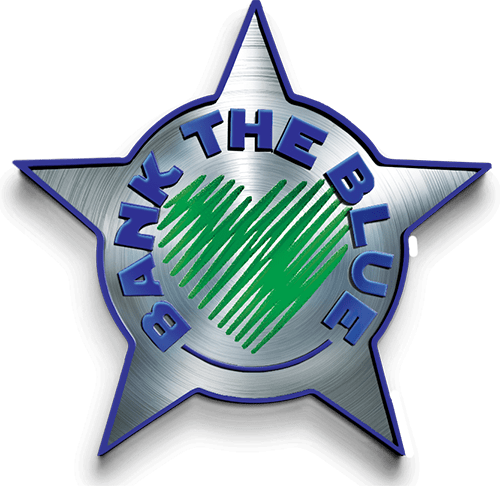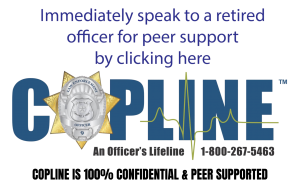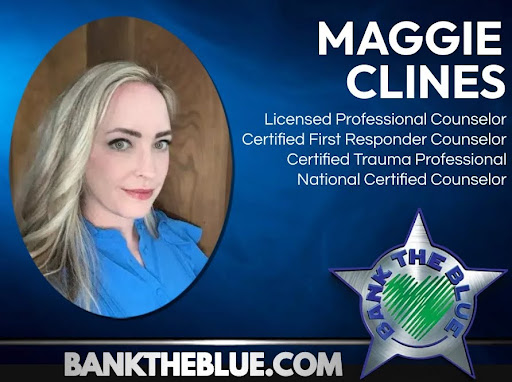Bank The Blue is delighted to introduce our newest clinician, Maggie Clines, LPC, who brings a wealth of experience and expertise in mental health counseling, particularly tailored to the needs of first responders. Maggie’s background and training uniquely position her to provide compassionate and effective care to those who serve and protect our communities.
Maggie Clines holds a bachelor’s degree in psychology and a master’s degree in clinical mental health counseling, both earned from DePaul University. These foundational qualifications, combined with her specialized post-graduate training in post-traumatic and acute traumatic stress, as well as first responder counseling, make her a valuable addition to our team.
With a focus on addressing prevalent issues faced by first responders, such as stress on the job, PTSD, depression, anxiety, marital issues, and substance use, Maggie is well-equipped to provide comprehensive support and treatment. Her extensive training includes immersive experiences such as active participation in police ride-alongs, demonstrating her commitment to gaining an in-depth understanding of the unique challenges and culture associated with first responders.
Maggie’s dedication to her work extends beyond her professional training. She has developed personal connections with active and retired police officers and firefighters, giving her a deep insight into the experiences and challenges unique to these professions. This personal connection enhances her ability to empathize and tailor counseling approaches specifically to meet the needs of first responders.
At Bank The Blue, we understand the importance of providing specialized mental health support to our first responders. Police officers and firefighters face high levels of stress and trauma in their daily work, and addressing their mental health needs is essential for their well-being and the safety of our communities.
In addition to Maggie Clines, our team of clinicians includes experienced professionals who are dedicated to providing quality mental health care to first responders. Each member of our team brings a unique set of skills and expertise to the table, allowing us to offer a comprehensive range of services to our clients.
We firmly believe that therapy cannot occur without solid rapport and trust. That’s why Maggie utilizes cognitive-behavioral therapy and narrative approaches, as well as her sense of humor, in sessions. Building a strong therapeutic relationship with her clients is at the core of Maggie’s approach, allowing her to provide compassionate and effective care.
We are honored to welcome Maggie Clines to our team and look forward to the valuable contributions she will make to our organization and the clients we serve. Together, we can continue to provide vital support to our first responders and promote mental health and well-being in our communities.
Mental health treatment for first responders is not just important—it’s crucial. By addressing the unique challenges and stressors faced by police officers and firefighters, we can help them build resilience, cope with trauma, and lead healthier, happier lives.
Bank the Blue’s efforts are implemented in partnership with certified mental health providers who specialize in trauma therapy, crisis management, and evidence-based therapies that are oriented for the unique needs of first responders.
All clinicians are culturally competent and fully vetted to specialize in treatment strategies for first responders.
The Unseen Challenges Faced by Law Enforcement
Every day, law enforcement officers confront a myriad of challenges and uncertainties that test their courage and resilience. While they bravely navigate these hurdles, the accumulation of stressors can take a toll on their mental health. The demands of the profession, exposure to traumatic incidents, and the constant pressure to make split-second, life-altering decisions contribute to a silent struggle that often goes unnoticed.
Despite the immense challenges, seeking help for mental health issues remains stigmatized within the law enforcement community. This stigma further exacerbates the hidden toll of stress, as officers may hesitate to seek support out of fear of appearing vulnerable or facing professional repercussions.
Building Resilience: The Importance of Therapy for Law Enforcement Officers
Therapy serves as a confidential sanctuary where officers can explore the emotional complexities of their roles without fear of judgment or reprisal. It offers a safe space where they can share experiences, fears, and struggles, fostering healing and resilience over time. Central to the therapeutic process is the establishment of confidentiality and trust, creating an environment where seeking help is not only accepted but encouraged.
Addressing Trauma
Therapy plays a crucial role in addressing and processing trauma. By confronting the emotional aftermath of critical incidents, officers can embark on a journey of healing and resilience. Through trauma-informed therapy, they can navigate the complex emotions associated with their roles, laying the foundation for long-term well-being.
Developing Coping Mechanisms
Therapy equips officers with essential skills to manage stress, anxiety, and the unique challenges they face in their profession. By learning effective coping mechanisms, they can enhance their overall mental well-being and resilience.
Enhancing Decision-Making
Improved decision-making is a direct outcome of effective therapy. Officers with enhanced mental well-being are better equipped to make sound judgments, contributing to a more competent and reliable law enforcement force.
Stress Management
Therapy provides officers with valuable tools and strategies for managing stressors effectively. By learning to cope with high-pressure situations in a healthy manner, they can prevent burnout and maintain their well-being.
Preventing Mental Health Issues
Regular therapy can serve as a preventive measure against the development of more severe mental health issues. By addressing stressors early on, officers can safeguard their mental well-being and mitigate the risk of escalation.
Empowerment and Self-Care
Therapy empowers officers to prioritize self-care and recognize the importance of their mental health. By establishing self-care routines and strategies, they can navigate the demands of their job while maintaining overall well-being.
Confidential Outlet
The confidential nature of therapy provides officers with a safe space to express themselves openly and honestly. This confidential outlet encourages introspection and emotional expression, fostering personal growth and resilience.
Building Resilience
Through therapy, law enforcement officers cultivate emotional resilience, enabling them to bounce back from adversity and maintain psychological well-being. By addressing trauma and developing coping mechanisms, they can emerge stronger and more resilient in the face of challenges.
The Transformative Impact of Therapy
The transformative impact of therapy extends beyond immediate relief, shaping the long-term well-being of officers. By addressing trauma, developing coping skills, and enhancing decision-making, therapy becomes an investment in the resilience and effectiveness of law enforcement personnel.
From struggle emerges resilience. Through trauma-informed healing and skill development, officers can navigate the complexities of their roles with strength and resilience, ultimately contributing to a safer and healthier community.
Learn more about Bank The Blue’s certified mental health clinicians at https://banktheblue.com/our-clinicians


